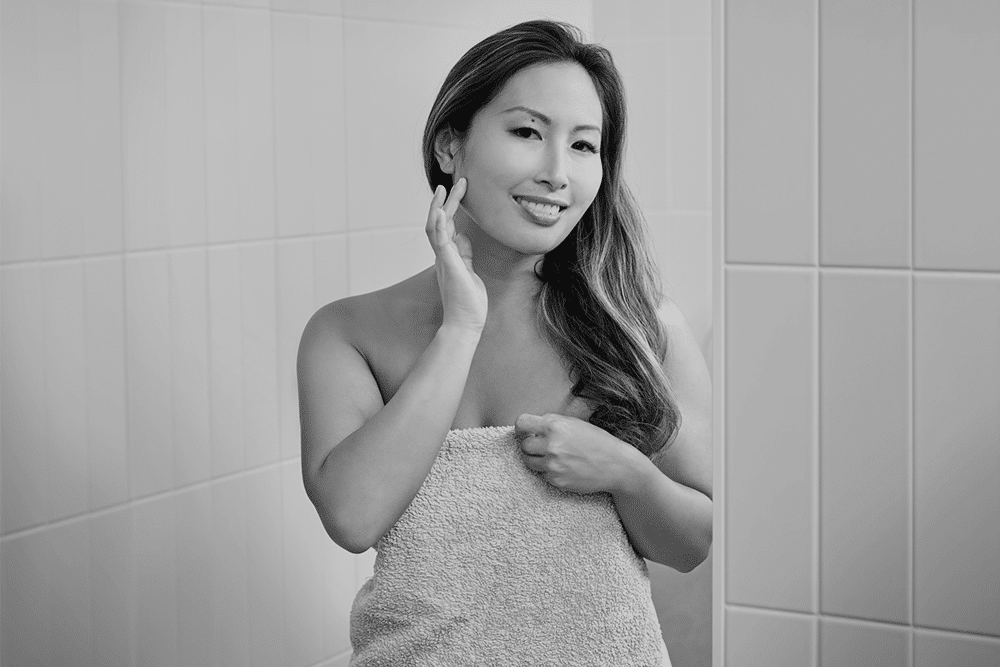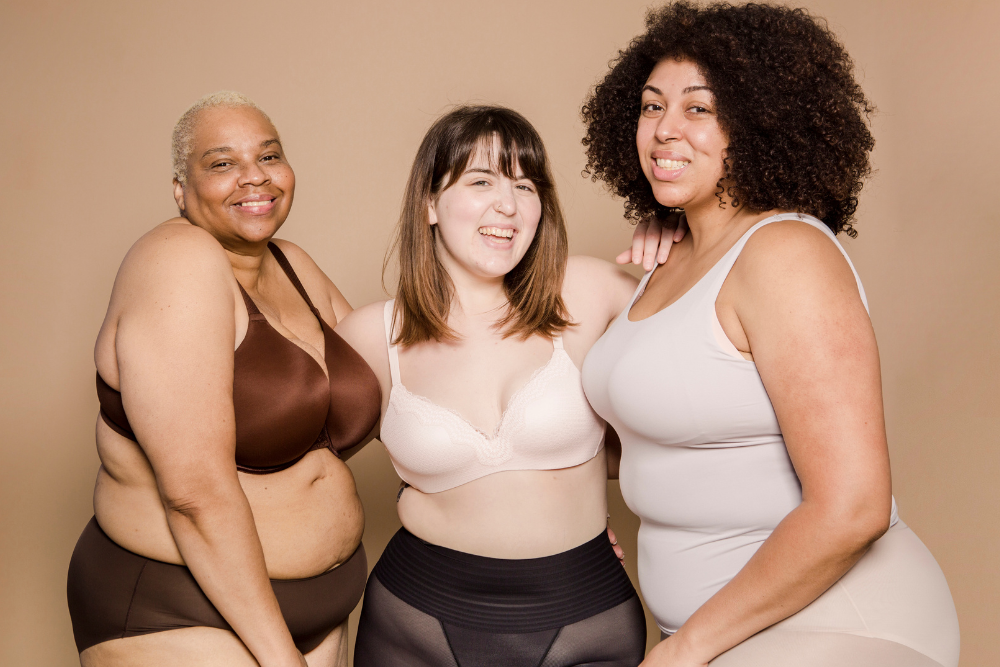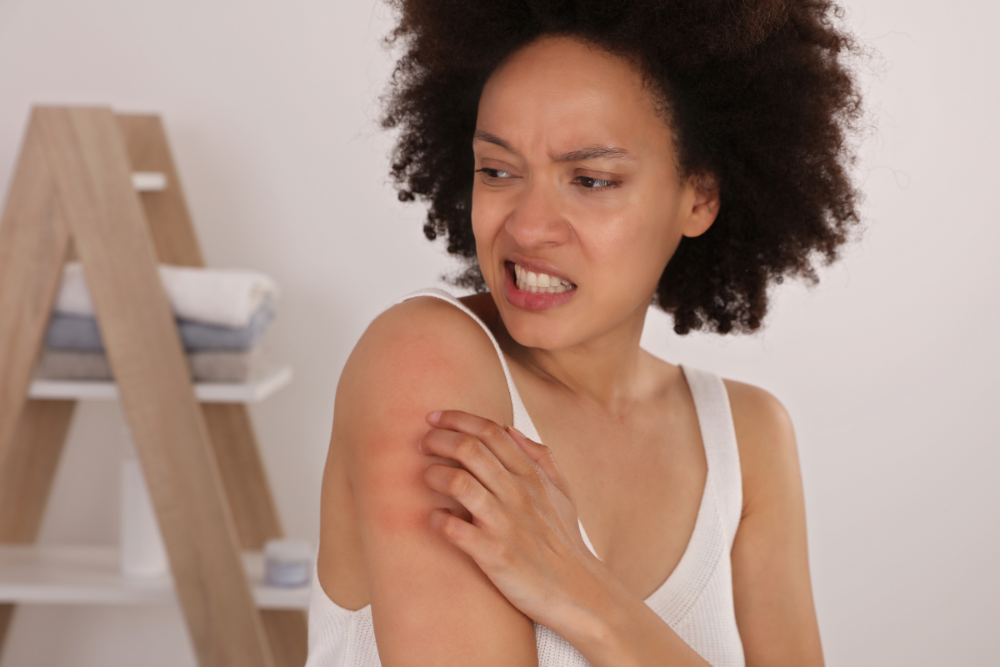Over time, hormonal fluctuations can cause a range of changes in the body, including acne. Hormonal acne is a common condition that can be frustrating and difficult to manage. However, there are several strategies that can help to treat and prevent hormonal acne, including the use of hormonal oral contraceptives like the pill.
So, let’s explore the causes and symptoms of hormonal acne, as well as the potential benefits of hormonal contraception in managing this condition. Whether you are dealing with occasional hormonal breakouts or more persistent acne, you’ll find valuable insights and guidance to help you achieve healthy and clear skin.
First, what is hormonal acne?
Hormonal acne is a type of acne that is caused by hormonal imbalances in the body, specifically an excess of androgens (male hormones), such as testosterone. These hormones are responsible for stimulating the sebaceous glands in the skin to produce more oil, which can lead to clogged pores and, you guessed it; acne.
Hormonal acne typically presents as deep, cystic, or inflamed pimples along the jawline, chin, and neck and is often accompanied by oily skin, blackheads, and whiteheads. It is more common in women than men and is often associated with hormonal fluctuations during puberty, menstruation, pregnancy, and menopause.
Hormonal acne can be difficult to treat, as it is caused by internal imbalances rather than external factors, such as bacteria or oil buildup.
What are the symptoms of hormonal acne?
The symptoms of hormonal acne can vary from person to person and may include:
Acne that appears primarily on the chin, jawline, and lower face
Deep, cystic acne that is painful and inflamed
Small, red bumps or blackheads
Increased oil production in the skin
Mood changes or irritability
Fatigue and low energy levels
Who does hormonal acne affect?
Hormonal acne affects anyone; however, it is most commonly experienced by adult women during certain stages of life. Hormonal fluctuations during puberty, pregnancy, menopause and different stages of the menstrual cycle can trigger acne breakouts. Hormonal acne can also be exacerbated by certain lifestyle factors, such as stress, diet, and the use of certain medications. While hormonal acne is more common in women, men can also experience it due to hormonal imbalances or certain medications.
What are the common causes of hormonal acne?
Common causes of hormonal acne include:
Puberty
Puberty is a time of significant physical and hormonal changes in the body as it transitions from childhood to adulthood. During this time, the body undergoes a surge of hormone production, including androgens such as testosterone, which play a key role in the development of acne.
Androgens stimulate the sebaceous glands in the skin to produce more oil or sebum. This excess oil, combined with dead skin cells and bacteria, can clog hair follicles and lead to the development of acne. The bacteria that cause acne thrive in the oily environment created by the excess sebum, leading to inflammation and the characteristic red bumps and pustules of acne.
Menstruation
During the menstrual cycle, there are changes in hormone levels, particularly in estrogen and progesterone, which can affect the skin and lead to acne.
In the days leading up to menstruation, levels of progesterone increase, which can cause the sebaceous glands to produce more oil. This can lead to clogged pores and acne, particularly around the chin and jawline.
Additionally, during menstruation, there is an increase in prostaglandins, which are inflammatory molecules that can contribute to acne. This can lead to an increase in the number and severity of acne lesions during this time.
Pregnancy
During pregnancy, the body produces higher levels of hormones such as estrogen and progesterone, which can affect the skin’s oil production and contribute to acne. In some women, pregnancy can also cause an increase in androgen levels, which can stimulate the oil glands to produce more oil.
Hormonal changes during pregnancy can also lead to an increase in inflammation, which can worsen acne lesions, making them more difficult to treat. Stress is another acne-causing factor during pregnancy, with some women experiencing higher levels of stress that can lead to and exacerbate acne.
Polycystic ovary syndrome (PCOS)
Polycystic ovary syndrome (PCOS) is a hormonal disorder that affects women of reproductive age. It is characterised by an imbalance of hormones, including an increase in androgens, which can contribute to hormonal acne.
Women with PCOS may also have enlarged ovaries that contain small cysts. These cysts can affect hormone production and lead to an increase in androgen levels, which amp up oil production and clog pores to cause acne.
Menopause
Menopause is a natural biological process that marks the end of a woman’s reproductive years. During this time, the body undergoes significant hormonal changes, which can contribute to hormonal acne.
As women approach menopause, the levels of estrogen and progesterone in the body decrease, while androgen levels may remain the same. This hormonal imbalance can stimulate the oil glands to produce more oil, which can lead to clogged pores and acne.
Additionally, menopausal women may experience an increase in inflammation due to changes in the immune system, which can exacerbate acne breakouts and make them more difficult to treat. They may also experience stress, which can play a role in acne development.
Learn the symptoms of early and premature menopause!
Stress
Stress is a common cause of hormonal acne in both men and women. When a person experiences stress, the body produces the hormone cortisol, which can stimulate the oil glands to produce more oil. This excess oil, combined with dead skin cells and bacteria, can clog pores and lead to the development of acne.
Stress can also lead to an increase in inflammation and disrupt the balance of other hormones in the body, such as estrogen and progesterone, which can also contribute to the development of acne. Furthermore, stress can lead to unhealthy habits such as poor diet, lack of sleep, and inadequate skincare, which can cause acne.
Medications
Certain medications can cause hormonal acne as a side effect. Generally, these are medications that alter hormone levels in the body, such as corticosteroids and birth control pills or medications that increase sensitivity to androgens. Other medications, such as anti-seizure drugs, anti-tuberculosis drugs, and certain antipsychotics, may also cause acne as a side effect by increasing the body’s production of hormones like cortisol, which can contribute to acne development.
Note that not all acne is caused by hormones, and other factors such as genetics, diet, and skincare routine can also play a role in the development of acne. If you are experiencing persistent acne or other symptoms, it is recommended to speak with a healthcare provider to determine the underlying cause and appropriate treatment options.
Do diet and lifestyle affect hormonal acne at all?
Yes, diet and lifestyle can have an impact on hormonal acne. While hormones play a major role in the development of hormonal acne, certain lifestyle factors can worsen acne breakouts or make them more difficult to treat. Here are some ways that diet and lifestyle can affect hormonal acne:
Diet
Consuming a diet high in refined carbohydrates and sugars can lead to insulin resistance, which can contribute to hormonal imbalances and acne breakouts. On the other hand, consuming a diet high in fruits, vegetables, and whole grains can help to balance hormones and reduce inflammation, potentially improving acne symptoms.
Stress
High levels of stress can trigger hormonal imbalances, leading to acne breakouts. Stress reduction techniques such as yoga, meditation, or deep breathing exercises can help to manage stress and improve acne symptoms.
Sleep
Lack of sleep can lead to hormonal imbalances and increased inflammation, which can exacerbate acne breakouts. Getting enough sleep each night is important for overall health and can help to improve acne symptoms.
Skincare routine
Using harsh or irritating skincare products can worsen acne symptoms. It is important to choose gentle, non-comedogenic products that won’t clog pores or irritate the skin.
Exercise
Regular exercise can help to improve hormone balance and reduce inflammation, potentially improving acne symptoms. However, wearing tight clothing that traps sweat against the skin can lead to acne breakouts, so it’s important to choose breathable clothing and shower immediately after exercise.
While diet and lifestyle changes can help to improve acne symptoms, they may not be enough on their own to treat severe cases of hormonal acne. If you are experiencing persistent acne or other symptoms, it is recommended to speak with a healthcare provider to determine the underlying cause and appropriate treatment options.
How to treat hormonal acne
Treating hormonal acne can be challenging, as it is caused by hormonal imbalances in the body. However, there are several acne treatment options that may help to improve adult acne symptoms. Here are some common ways to treat hormonal acne:
Topical treatments
Topical prescription skincare treatments, such as topical retinoids, benzoyl peroxide, and salicylic acid, can help to reduce inflammation and unclog pores. These treatments are often used in combination with other treatments for the best results.
Hormonal therapy
Oral contraceptives, such as birth control pills, can help to regulate hormones and treat acne symptoms. Oral contraceptives are usually only recommended for women.
Learn 10 reasons to take the birth control pill!
Antibiotics
Antibiotics can help to reduce inflammation and kill acne-causing bacteria. However, long-term use of antibiotics can lead to antibiotic resistance and other side effects, so they are typically only used for short periods of time.
Lifestyle changes
As mentioned earlier, diet and lifestyle changes can help with treating acne symptoms. Eating a healthy diet, managing stress, getting enough high-quality sleep, and exercising regularly can all help to balance hormones and reduce inflammation associated with acne.
Professional treatments
Professional treatments, such as chemical peels, microdermabrasion, or light therapy, can help to reduce inflammation and improve acne symptoms. These treatments are typically performed by a dermatologist.
It’s important to note that not all treatments will work for everyone, and it may take some trial and error to find the best treatment for your individual case of hormonal acne. It can take several weeks or months to see significant improvement in acne symptoms, so patience is key. If you are experiencing persistent acne or other symptoms, speak with a healthcare provider to determine the underlying cause and appropriate treatment options.
Natural remedies for hormonal acne
While there is no surefire cure for hormonal acne, there are some natural remedies that may help to improve symptoms and reduce acne severity when used in combination with proven acne treatments. These include:
Eating a healthy diet
Consuming a diet rich in whole foods, fruits, and vegetables can help to support overall health and reduce inflammation in the body, which can contribute to acne.
Managing stress
Stress can trigger hormonal imbalances and exacerbate acne. Practising stress-management techniques, such as yoga, meditation, or deep breathing, may help to reduce stress levels and improve acne symptoms.
Getting enough sleep
Getting adequate sleep is crucial for maintaining hormonal balance and promoting overall health. Aim for 7-8 hours of sleep each night. Practising good sleep hygiene can help if you’re struggling to get a good night’s sleep most nights.
Herbal remedies
Some herbs, such as tea tree oil, chamomile, and calendula, have been shown to have anti-inflammatory and antibacterial properties that can help to reduce acne symptoms. These herbs can be used topically in the form of creams, gels, or essential oils.
Probiotics
Taking probiotics can help to improve gut health and reduce inflammation in the body, which can contribute to hormonal imbalances and acne.
Vitamin and mineral supplements
Some vitamins and minerals, such as vitamin A, zinc, and omega-3 fatty acids, have been shown to be beneficial for reducing acne symptoms. Consult with a healthcare professional before starting any supplement regimen.
Note that natural remedies may not work for everyone, and persistent or severe acne may require medical treatment. Always consult with a healthcare professional for personalised advice on managing hormonal acne.
We’re here to help!
If hormonal acne stresses you out, our Australian-based medical team can help with prescription acne treatments online with delivery to your door. Start a consultation today!





